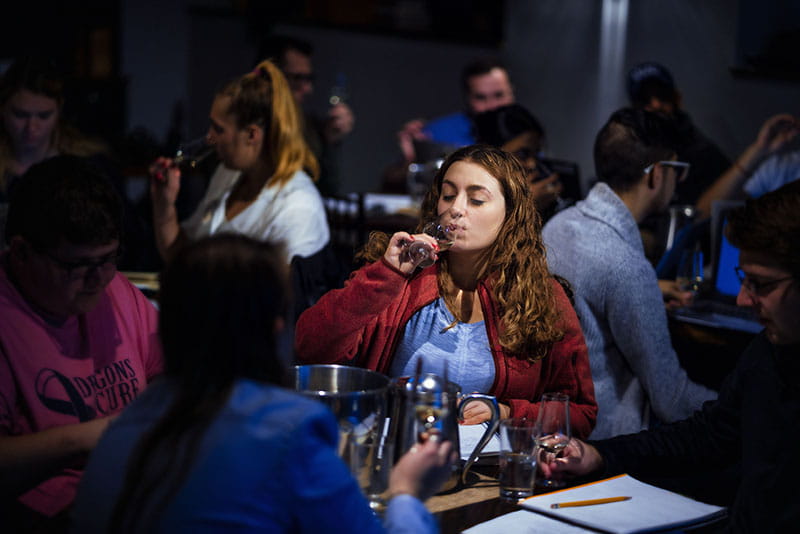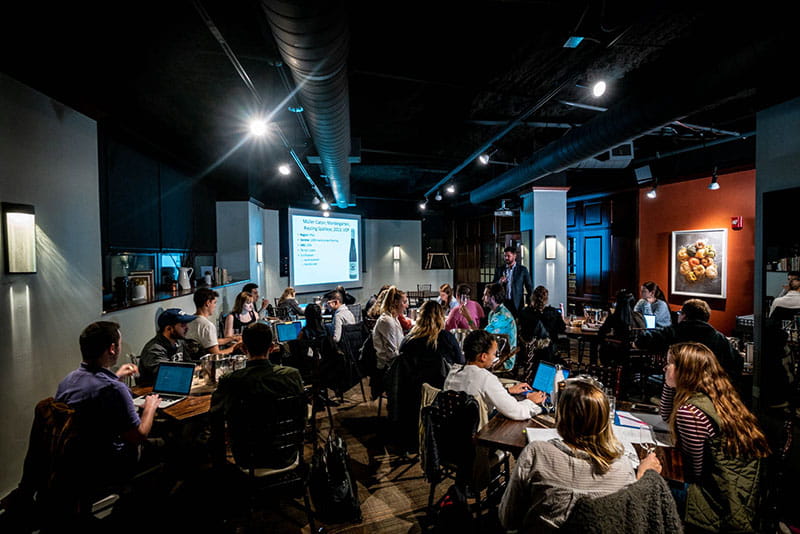Wine and Spirits Class Helps Seniors to Palate Esoteric Subject

Photos by Branden Eastwood.
This piece is part of the new DrexelNow series showcasing "A Day in the Class" for some of Drexel University's most interesting and impactful courses.
Stepping into an HRM 435 class may feel more like being welcomed into a top-scale wine bar, or invited to a premiere wine tasting.
This introductory course on wine and spirits, which is part of the food and beverage management concentration for all hospitality majors in Drexel University’s Center for Food & Hospitality Management and is also open to all seniors at the University, takes place in the newly renovated, dimly lit Academic Bistro. Students take their seats at restaurant tables in front of a setting with full water jugs and empty wine glasses. The only initial indications that this is a classroom is the Powerpoint presentation projected in the front corner, and the laptops or notebooks littered near students’ seats.
This introductory course on wine and spirits, which is part of the food and beverage management concentration for all hospitality majors in Drexel University’s Center for Food & Hospitality Management and is also open to all seniors at the University, takes place in the newly renovated, dimly lit Academic Bistro. Students take their seats at restaurant tables in front of a setting with full water jugs and empty wine glasses. The only initial indications that this is a classroom is the Powerpoint presentation projected in the front corner, and the laptops or notebooks littered near students’ seats.
Soon, it’s time to start tasting. O’Neill expertly pours the first Riesling for each student as they start smelling, swishing and taking notes in their dossier, recording appearance, smell, taste and palate.
“This wine with sushi is fantastic. Same with most Asian food," O'Neill said matter-of-factly. "I would take this wine to Han Dynasty to forget about life for a little while, maybe with a bowl of Dan Dan noodles.”
“This wine with sushi is fantastic. Same with most Asian food," O'Neill said matter-of-factly. "I would take this wine to Han Dynasty to forget about life for a little while, maybe with a bowl of Dan Dan noodles.”
It’s this wide range of different students — as well as their various reasons for taking it — that’s one of the “cooler aspects” of the class for O’Neill.
“My main goal is to literally introduce them to everything across the board, all the different options,” he says.
In today’s class, students go on to taste everything from a Blaufränkisch to wine from the Rioja region in Spain. O’Neill introduces about five or six different wines from a variety of producers and representing a variety of price ranges each time the class meets — that cost covered by an up-front materials fee.
The goal of each class and what they’re tasting?
“I want to be able to tell the story of a specific region,” O’Neill says. “From there, I’ll go to producers. What are the producers of that particular region? Then I’ll start doing value shopping. ‘Is it on sale this week? Great!’”
Though some students might go into the class thinking it will be a breeze or a party, they’d be mistaken. The workload is not extreme, but is existent, as students are graded through a series of quizzes, tests, reading outlines, completed dossiers and participation.
“If you’re thinking you’re going to take this class and it’s going to be super easy, it can be if you’re really committed to it,” O’Neill says. “I think many people don’t realize how difficult this industry is as a whole. “
O’Neill himself has more than 20 years in the food industry and working in restaurants. He started out in the kitchen, but moved into front-of-house work while he was finishing up his undergraduate degree. He moved to Philadelphia in 2006 and worked with the Vetri organization, started by Drexel alum Marc Vetri ’90, for eight years, both at the namesake restaurant and at Osteria. That’s where he met Michael Traud, assistant clinical professor and director of the Center, who invited him to start teaching at Drexel.
O’Neill himself has more than 20 years in the food industry and working in restaurants. He started out in the kitchen, but moved into front-of-house work while he was finishing up his undergraduate degree. He moved to Philadelphia in 2006 and worked with the Vetri organization, started by Drexel alum Marc Vetri ’90, for eight years, both at the namesake restaurant and at Osteria. That’s where he met Michael Traud, assistant clinical professor and director of the Center, who invited him to start teaching at Drexel.
O’Neill said he brings his personal experience into the classroom because it helps break up the historical technical elements of learning about these wine regions, and also makes the information more relatable and relevant.
“My No. 1 job in hospitality is to disarm people,” he said. “If you can’t disarm your guests and make them feel welcome and comfortable, all of that other stuff is never going to matter, and I approach the classroom the same way.”
This approach is apparent to students in this section of HRM 435. Meghan Knecht, a fifth-year biomedical engineering student taking the class, said O’Neill kept his promise from the first class that he would know every student’s name by the second.
“I thought that was really unique,” she said. “He knows every one of us and cares about every one of us. He doesn’t care that this is the only class [some of us will] take with him, or that we don’t know anything about the hospitality.”
“I thought that was really unique,” she said. “He knows every one of us and cares about every one of us. He doesn’t care that this is the only class [some of us will] take with him, or that we don’t know anything about the hospitality.”
“But it definitely isn’t a breeze. … It forces you to learn and retain the information that you’re hearing,” she said.
Gonzalo Alcalde, a fourth-year hospitality management student, said that O’Neill and his fellow classmates make the course interesting.
“My usual table is composed of an engineer and a fashion designer,” he said. “I’ve never taken classes with people from those majors, so it’s a great thing.”
Alcalde said the class will be beneficial to his future career in the hospitality industry, especially in tourism epicenters like his home country of Spain. Additionally, he said O’Neill is the “perfect teacher” for this subject.
“Wine can get really complicated,” he said. “By him telling us stories, it helps the material be a little less intimidating.”
“Wine can get really complicated,” he said. “By him telling us stories, it helps the material be a little less intimidating.”
“To me, it supports so many different aspects of Drexel’s mission,” he said, citing that the class is experiential and has several research components. “It’s kind of forward-thinking that, you know, there’s this whole artistry that people are embracing, and I think that Drexel is always, at least my experience here, forward-facing in that respect. It adds to the whole Venn diagram of what a Drexel student should be.”
In fall 2019, this class will adopt a new course name, “Wine Regions of the World.” A separate spirits course, HRM 436 “Spirits and Mixology” has been added to the food and beverage management curriculum. Watch out for more details coming soon.

Drexel News is produced by
University Marketing and Communications.

